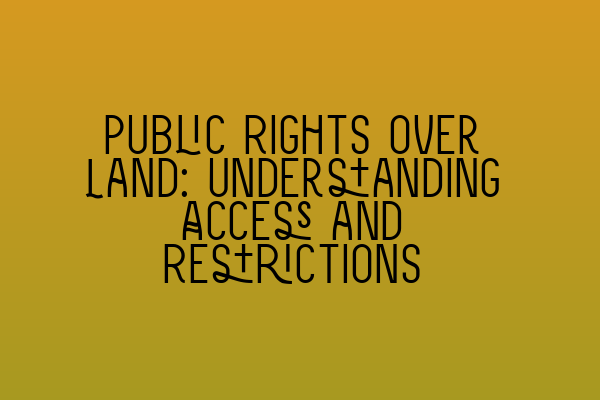Public Rights over Land: Understanding Access and Restrictions
As property law solicitors at SQE Property Law & Land Law, we believe it is crucial for individuals, homeowners, and businesses to have a comprehensive understanding of public rights over land. Whether you are a homeowner looking to understand your rights or a property developer aiming to navigate legal complexities, this blog post will provide you with crucial insights into access and restrictions on land.
Access to land is a fundamental aspect of property law, ensuring that individuals and the public can enjoy and utilize land in a fair and equitable manner. Public rights over land encompass various legal principles, including access to public highways, rights of way, access to public paths and bridleways, and access to common land.
One of the most common forms of public rights over land is the right of way. A right of way allows individuals to pass through land owned by another party. There are two main forms of rights of way: public rights of way and private rights of way. Public rights of way usually arise due to long-standing usage by the public. These rights are often protected by law and cannot be obstructed or restricted by the landowner.
Private rights of way, on the other hand, are usually established through legal agreements or easements. They grant specific individuals or groups the right to access a particular part of land owned by another party. Private rights of way can be subject to conditions and restrictions agreed upon by both parties involved.
Understanding the nature and extent of public rights over land is essential to ensure compliance with legal obligations. Landowners must be aware of any existing public rights of way on their property and take appropriate measures to abide by them. Failure to do so can lead to legal disputes and potential liability.
In addition to public rights over land, it is equally important to consider the restrictions that may be imposed on land use. Planning restrictions and environmental regulations play a crucial role in governing how land can be used and developed. These restrictions are in place to ensure sustainable development, prevent harm to the environment, and maintain the character of an area.
Local planning authorities regulate land use through planning permission processes and development plans. Any proposed development or change in land use must go through this process to ensure compliance with local regulations. It is vital to consult with planning professionals and solicitors who specialize in property law to navigate these complexities effectively.
When considering property development or land use, it is also essential to be aware of any restrictions imposed by covenants and easements. These legal agreements can restrict or regulate the use of land in various ways, such as prohibiting certain types of developments or activities. It is crucial to review the title deeds and consult with legal professionals to understand any existing restrictions that may impact your plans.
At SQE Property Law & Land Law, we specialize in helping individuals and businesses navigate the complexities of public rights over land and land use restrictions. Our team of experienced property law solicitors can provide expert guidance and advice to ensure compliance with legal obligations and achieve successful outcomes for your property matters.
To further enhance your understanding of property law and prepare for the SQE exams, we recommend checking out our related articles:
1. SQE 1 Practice Exam Questions: Test your knowledge and readiness for the SQE 1 exam with our comprehensive practice exam questions.
2. SQE 1 Practice Mocks FLK1 FLK2: Build your confidence and familiarize yourself with the format and content of the SQE 1 exam with our practice mocks.
3. SQE 2 Preparation Courses: Prepare effectively for the SQE 2 exam with our specialized preparation courses designed to cover all the necessary topics and skills.
4. SQE 1 Preparation Courses: Lay a strong foundation for your SQE 1 exam success with our comprehensive preparation courses.
5. SRA SQE Exam Dates: Stay updated with the latest exam dates and deadlines for the SRA SQE exams.
By staying informed and seeking expert guidance, you can ensure a smooth and successful journey through the intricacies of public rights over land. Contact SQE Property Law & Land Law today to learn more about our services and how we can assist you with your property law needs.
